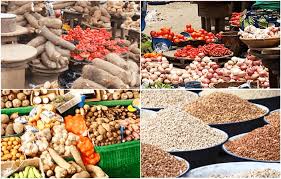Lagos State government has touched the lives of over two million households through its targeted food subsidy and support programmes, the Commissioner for Agriculture and Food Systems, Ms Abisola Olusanya, has said.
“Under the State Food Subsidy Initiatives, we have successfully reached over 800,000 households.”These programmes provide much-needed financial relief, enabling families to access essential food items,” she said at a press conference attended by the state Commissioner for Information and Strategy, Mr Gbenga Omotosho in Lagos.
She said the State Food Bank Support programme has extended its reach even further, providing vital sustenance to those in critical need. “More than 1,285,000 households have received crucial support through our food bank interventions,” Ms. Olusanya affirmed, highlighting the government’s commitment to ensuring no one goes hungry.
She detailed the impact of the Ministry’s strategic initiatives, emphasising a four-pronged approach aimed at building a resilient, inclusive, and sustainable food system for all. The core strategies include enhancing local food production, establishing crucial upcountry partnerships, developing robust food storage and logistics infrastructure, and improving market infrastructure across the state.
“Our mission has been laser-focused on creating a food system that is not only sustainable but also ensures that every Lagosian has access to nutritious and affordable food.This vision is being realised through a multi-faceted strategy that addresses the entire food value chain, from farm to table,” Ms. Olusanya stated.
A key focus of the Ministry’s efforts,according to her has been the drive to boost domestic food production within the state. Ms. Olusanya highlighted the strategic targeting of value chains where the state holds a comparative advantage, including poultry, fisheries, piggery, coconut, and horticulture.
“We are strategically investing in and supporting our local farmers and producers in key sectors. This not only increases the availability of fresh, locally sourced food but also creates vital employment opportunities within our communities,” she explained.
In recognition of the limitations of solely relying on local production, she said the Ministry has actively cultivated “upcountry partnerships” with other states. She said the collaborations are aimed to augment food supply to Lagos, ensuring a consistent and diverse range of food products for its residents.
“Our partnerships with other states are crucial in ensuring a stable and reliable food supply chain for Lagos. By working collaboratively, we can overcome geographical limitations and provide Lagosians with the food they need,” Ms. Olusanya emphasised.
The adoption of community-driven development approaches in projects such as FADAMA III and Lagos CARES,have also yielded significant benefits as they have fostered increased local integration and ownership, improved governance at participating Local Government Areas (LGAs), and promoted Small and Medium-sized Enterprises (SMEs), indirectly benefiting approximately 100,000 individuals and small business owners.
Ms. Olusanya highlighted the transformative impact of the Lagos Rice Mill in Imota, commissioned in 2023. “The Imota Rice Mill, the largest of its kind in Africa, boasts an impressive capacity to produce 2.4 million 50kg bags of rice annually. The landmark project has already created 1,500 direct jobs and an estimated 254,000 indirect jobs, significantly boosting our economy,” she stated.
Emphasis, she noted, has been placed on developing critical infrastructure to ensure food availability and minimize waste. This, she explained, includes substantial investments in food storage and logistics capabilities, as well as the development of modern market infrastructure and systems to streamline food distribution across the state.
According to her, the government would soon commissioned the Lagos Central Food Security Systems and Logistics Hub, a flagship project envisioned to modernise and secure the state’s food distribution ecosystem. Conceptualised as a central, data-driven, and technologically integrated complex for food aggregation, storage, processing, and distribution, she explained that the hub is poised to be the largest food logistics hub in Sub-Saharan Africa upon completion.
“This hub is a game-changer for our food security strategy. It will feature facilities to service over 1,500 (40mt) trucks daily and is expected to significantly impact the N14 trillion food market in Lagos.” With the expected completion of Phase 1 within the next few months, it is anticipated to lead to a substantial reduction in food prices for Lagosians due to integrated facilities like cold and dry storage, a 14,000-capacity abattoir, and a jetty for streamlined goods transportation,” Ms. Olusanya said.
The Commissioner also highlighted the success of the Middle Level Agro-Produce Hub at Idi-Oro, Mushin, where food valued at N2,641,709,989 has already been traded. She further announced the identification of sites for three additional Mid-Level Hubs at Ikorodu, Festac Town, and Lekki Phase 1, aiming to decentralise food distribution and improve accessibility.
In Lagos, she explained that the FADAMA programme focused on key sectors such as fisheries, poultry, piggery, and horticulture, has implemented over 1,309 sub-projects and supporting over 10,000 households with essential inputs, equipment, and training. “This programme has been instrumental in boosting local production, contributing to a 43 per cen t increase in rice output through targeted interventions like land preparation and mechanization,” Ms. Olusanya explained.
According to her, the Lagos Aquaculture Centre for Excellence (LACE) represents another significant investment in the state’s food security infrastructure. “LACE is designed to produce 50 million fingerlings, 2,000 tons of table-sized fish, 20,000 tonnes of processed fish, and 24,000 tonnes of aquafeed annually. The centre aims to empower 5,000 smallholder fish farmers by providing them with quality inputs and serving as an off-taker for their produce, integrating them into the aquaculture value chain. The project is expected to create approximately 1,000 indirect jobs during its construction phase and 500 direct jobs upon completion, incorporating modern aquaculture technologies and serving as a hub for research and capacity building, ” she elaborated.
The Commissioner also highlighted the Red Meat Last Mile shops, a strategic initiative to modernise and sanitise the red meat value chain. “These shops ensure that residents have access to hygienically processed meat from government-approved abattoirs. Each shop is operated by four trained youths, creating employment opportunities. The initial rollout includes locations in Ijeh area of Dolphin Estate, Surulere, and Mushin, serving as pilot schemes for broader implementation,” she stated.
Under Enterprise Support – Financing, Ms. Olusanya disclosed that a remarkable 151,595 agri-businesses have received support through grants, inputs, tools, and advisory services, enabling them to scale sustainably. These includes various initiatives such as the Agrinnovation Club Grant (26 agro innovators), Eko Flavour Project (30 upcoming chefs), Ministry initiatives through LSADA/FADAMA (70,200 beneficiaries), Trader Money (15,000 market traders), Ounje Eko Farmer Subsidy Programme (4,000+), Ounje Eko Food Discount Market vendors (5,000), LAP (1,200), LCARES (33,639), CoconutProcessing Training (600), Apiculture Training (300), Rice Development/Production/Butchers Academy (1,300), APPEALS (17,000), Red Meat Support (3,000), and the Lagos Fresh Food Hub (600).
“The significant strides we have made in the past six years underscore our unwavering commitment to transforming Lagos State’s agricultural landscape. Through strategic planning, robust partnerships, and active community engagement, we have laid a solid foundation for a food-secure and economically vibrant Lagos,” Ms. Olusanya noted.
Looking ahead, the Ministry reaffirmed its dedication to ensuring that no Lagosian is left behind in the pursuit of sustainable food systems and economic prosperity, promising continued efforts to strengthen the state’s agricultural sector and enhance food security for all its residents.
The Nation





